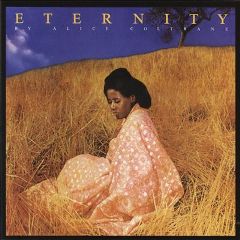Alice Coltrane – Eternity (1975)
Alice Coltrane – Eternity (1975)

1.Spiritual Eternal 2:55 2.Wisdom Eye 3:07 3.Los Caballos 11:22 4.Om Supreme 9:33 6.Morning Worship 3:30 7.Spring Rounds 5:59 Alice Coltrane - Arranger, Conductor, Direction, Fender Rhodes, Harp, Organ, Piano, Tambourine, Transcription Murray Adler - Violin George Bohanon - Trombone Oscar Brashear - Trumpet Jo Ann Caldwell - Contrabassoon Edward Cansino - Vocals Donald Christlieb - Bassoon Deborah Coomer - Vocals Rollice Dale - Viola Vincent DeRosa - French Horn John MacArthur Ellis - Oboe Pamela Goldsmith - Viola Anne Goodman - Cello Charlie Haden - Bass Terry Harrington - Clarinet, Sax (Tenor) Paul Hubinon - Trumpet Tommy Johnson - Tuba Susan Judy - Vocals Nathan Kaproff - Violin Ray Kelley - Cello Jackie Kelso - Clarinet, Sax (Tenor) Bill Kurasch - Violin Hubert Laws - Flute Charles Loper - Trombone Jacqueline Lustgarten - Cello Arthur Maebe - French Horn Gordon Marron - Violin Jack Marsh - Bassoon Mike Nowack - Viola Jean Packer - Vocals Armando Peraza - Congas Jerome Richardson - Flute (Alto), Sax (Soprano) Ben Riley - Drums, Drums (Bass), Gong Alan Robinson - French Horn Marilyn Robinson - French Horn Sid Sharp - Violin Julian Spear - Clarinet (Bass) Polly Sweeney - Violin Louise di Tullio - Piccolo Ernie Watts - Horn (English)
Within the first 30 seconds of "Spiritual Eternal," the opening track on Alice Coltrane's final studio album, Eternity, the listener encounters the complete palette of Alice Coltrane's musical thought. As her organ careens through a series of arpeggiated modal drones, they appear seemingly rootless, hanging out in the cosmic eternal. And they remain there ever so briefly until an entire orchestra chimes in behind her in a straight blues waltz that places her wondrously jagged soloing within the context of a universal everything -- at least musically -- in that she moves through jazz, Indian music, blues, 12-tone music, and the R&B of Ray Charles. This is the historical and spiritual context Alice Coltrane made her own, the ability to open up her own sonic vocabulary and seamlessly enter it into an ensemble context for an untold, unpredictable expression of harmonic convergence. While many other players have picked up on it since, Coltrane's gorgeous arrangements and canny musical juxtapositions never seem forced or pushed beyond the margins. Perhaps, as evidenced by "Wisdom Eye," "Om Supreme," and the "Loka" suite, it's because Coltrane already dwells on the fringes both musically and spiritually, where boundaries dissolve and where everything is already inseparable. But this does not keep her music from being strikingly, even stunningly beautiful -- check out the killer Afro-Cuban percussion under her soloing on "Los Caballaos," which is rooted in a harmonically complex, diatonic series of whole tones. In numerous settings from orchestra to trio, Ms. Coltrane finds the unspeakable and plays it. Nowhere is this more evident than in "Spring Rounds" from Igor Stravinsky's "Rite of Spring," which closes the album. Her faithfulness to the material with a complete orchestra under her control is one of shimmering transcendence that places the composer's work firmly in the context of avant-jazz. Her control over the orchestra is masterful, and her reading of the section's nuances and subtleties rivals virtually everyone who's ever recorded it. Eternity is ultimately about the universality of tonal language and its complex expressions. It is an enduring recording that was far ahead of its time in 1976 and is only now getting the recognition it deserves. ---Thom Jurek, Rovi
download: uploaded yandex 4shared mediafire solidfiles mega zalivalka cloudmailru filecloudio anonfiles oboom








